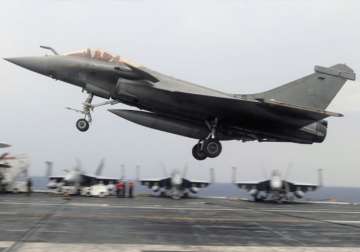The Indian Air Force (IAF) has finalised plans to host the first squadron of Rafale fighter jets, which are also capable of delivering nuclear weapons.
According to reports, the first 18 Rafales will be stationed at the Hasimara airbase in Bengal from late-2019. The decision is said to be a part of the overall policy to gradually build nuclear as well as conventional deterrence against China.
Hasimara is an important air base of the Eastern Command in northern West Bengal, located close to China, Bangladesh and Bhutan border and set up after the India-China war of 1962.
It is only kilometres away from the India-Bhutan border. Nestled amid tea gardens and forests, it is known as the 'Gateway to Bhutan'.
Hasimara airbase already houses two squadrons of MiG 27, which are likely to be phased out in the next few years. The base also hosts Akash missile systems.
"The Hasimara airbase currently has MiG-27s that will be retired over the next two-three years. They will be replaced by Rafales. A team from Dassault Aviation has already visited Hasimara to review the maintenance and other infrastructure required there," an official said.
"The Sarsawa base (UP), among other places, is being considered for the second Rafale squadron,” the official added.
The development comes at a time when India is conducting final trials of the nuclear-capable Agni-IV and Agni-V ballistic missiles after the Strategic Forces Command inducted the Agni-III a couple of years ago.
Rafale is a multi-role combat aircraft built by Dassault Aviation of France. India and France signed an inter-government agreement for the purchase Rafale fighters off the shelf on September 23 last year. Under the Rs 59,000 crore deal, the IAF will get 36 Rafales in batches by mid-2022 or so.
The IAF currently has 33 combat squadrons against a sanctioned strength of 39.5, which is sought to be raised to 42. The then Air Force chief, Air Chief Marshal Arup Raha, told the media days before his retirement on December 31 that the IAF needs at least 200 more fighter jets in the next 10 years.
Latest India News

